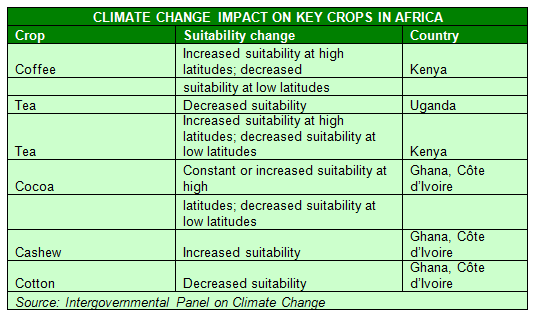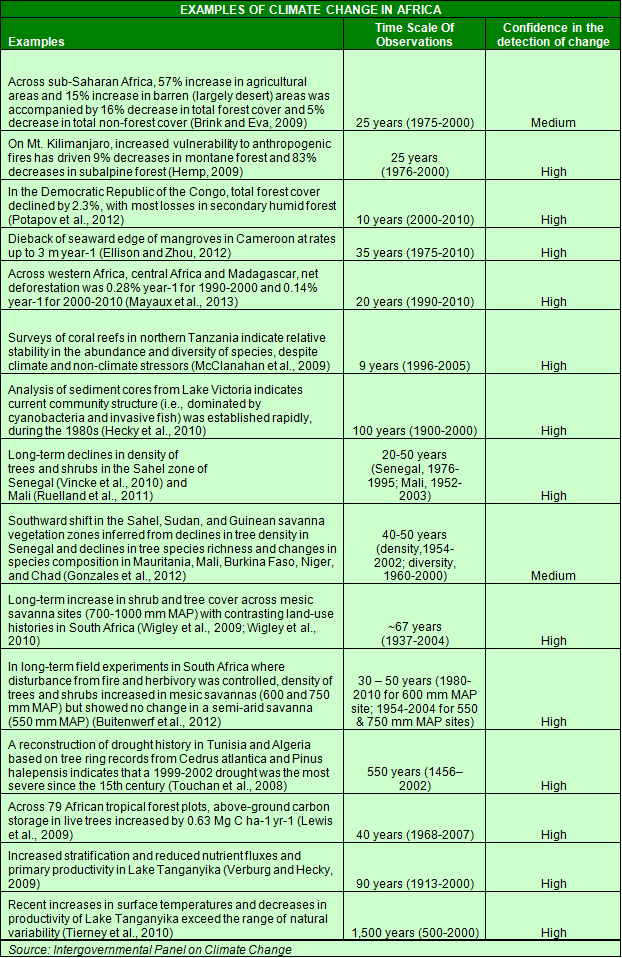The Intergovernmental Panel on Climate Change's (IPCC) latest report says African states may need to spend between USD 20 billion and 30 billion annually over the next two decades to adapt to climate change and protect rural and urban livelihoods, societies and economies.
That figure could reach USD 60 billion by 2030, and the IPCC believes the figures are "likely to be under-estimates."
"Africa as a whole is one of the most vulnerable continents due to its high exposure and low adaptive capacity climate, ecology and political boundaries in Africa vary across the continent," the IPCC noted.
Of nine climate-related key regional risks identified for Africa, eight pose medium or higher risk even with highly adapted systems, while only one key risk assessed can be potentially reduced with high adaptation to below a medium risk level, the report warned.
The UN-sponsored IPCC reports are compiled with input from hundreds of climate scientists and it's considered the most authoritative research on the impacts of global warming on the global economy.
While previous IPCC reports have been more unequivocal in linking human activity to global warming, the current study has stepped back from its 'alarmist' stance that had often been used by environmental groups to push through a green-at-all-cost agenda.
Instead, IPCC's latest research is more reserved in its opinion.
"The latest report backs off from some of the predictions made in the previous IPCC report, in 2007," according to the New Scientist. "During the final editing process, the authors also retreated from many of the more confident projections from the final draft, leaked last year. The IPCC now says it often cannot predict which specific impacts of climate change - such as droughts, storms or floods - will hit particular places."
EXTREME WEATHER
While the IPCC has avoided using hard numbers, it has "high confidence" that places like the Ethiopian Highlands will receive increased rainfall, in some cases "extreme rainfall" in this century.
The IPCC estimates that climate change will amplify existing stress on water availability in Africa.
"Water resources are subjected to high hydro-climatic variability over space and time, and are a key constraint on the continent's continued economic development," the report noted.
The effects of climate change would put pressure on already water-stressed region.
Indeed, climate change would have a deep and direct impact on the continent's agriculture sector. Floods and -- alternatively droughts -- would hurt agriculture sector, which is an important source of job creation for many countries.
"In addition, recent increases in global food prices aggravate food insecurity among the urban poor, increasing the risk of malnutrition and its consequences. . For example, it was estimated that the global rise in food prices has contributed to the deaths of an additional 30,000 to 50,000 children suffering from malnutrition in 2009 in sub-Saharan Africa," the report noted.
"This situation may be complicated further by changes in rainfall variability and extreme weather events affecting the agriculture sector."
FINANCING CLIMATE CHANGE POLICIES
Climate change will have a direct and immediate impact on African economies. Tanzania, for example, may see an increase in poverty as 50% of its gross production and 80% of its employment is generated by agriculture.
Namibia could see annual losses to the economy between 1.0% and 4.8% of GDP.
"Ghana's agricultural and economic sector with cocoa being the single most important export product is particularly vulnerable, since cocoa is prone to the effects of a changing climate, which has been central to the country's debates on development and poverty alleviation strategies," the IPCC said.
In South Africa's key city of Cape Town, the risk of rising sea levels could cost the city as much as USD 30 billion over a 25-year period, in terms of losses in tourist revenues and cost of infrastructure replacement.
Other coastal cities such as Alexandria in Egypt, Benin City, Port Harcourt and Aba in Nigeria are also vulnerable to rising sea levels, which could disrupt tourism and fisheries sector.
"More than a quarter of Africa's population lives within 100 km of the coast and more than half of Africa's total population living in low-elevation coastal zones is urban, accounting for 11.5% of the total urban population of the continent," the IPCC noted.
GREEN MEASURES
While climate change is a global issue, the African continent has taken some measures to address the problem with the development of an African Green Growth Strategy that fosters a "sustainable low-carbon growth through a linked adaptation-mitigation approach, with adaptation seen as an urgent priority."
In 2009, the African Development Bank collaborated with Climate Investment Fund (CIF) to develop investment programmes in 16 African nations. The programme already has 11 projects under way with a strong spate of new projects. AfDB has already channeled USD450-million to CIF funds.
Some of the combined projects include USD962-million in accelerating global solar projects in Egypt, Algeria, Morocco and Tunisia, USD350-million to develop wind, solar and urban transport and Gulf of Suez windfarms, and USD350-million in supporting renewables, energy efficiency and urban transportation in Nigeria.
It is unclear whether such developments will be enough to stave off the effects of climate change, especially as African states are likely to produce more carbon emissions as they embark on multi-billion projects to develop their minerals, metals and hydrocarbon sector.
But the IPCC report notes that careful planning and could help mitigate the impact of climate change.
Rather than being alarmist, there is an opportunity to save the environment but also create solutions that generates jobs and dollars.
"Investments in better preparation can pay dividends both for the present and for the future," said Vicente Barros, Co-Chair of the IPCC's Working Group.
However, the IPCC scientists believe climate change adaptation is not an "exotic agenda that has never been tried."
Governments, firms, and communities around the world are building experience with adaptation, according to Chris Field, co-chair of the IPCC Working Group.
"This experience forms a starting point for bolder, more ambitious adaptations that will be important as climate and society continue to change."
"We definitely face challenges, but understanding those challenges and tackling them creatively can make climate-change adaptation an important way to help build a more vibrant world in the near-term and beyond."
The feature was produced by alifarabia.com exclusively for zawya.com.
Zawya 2014




















